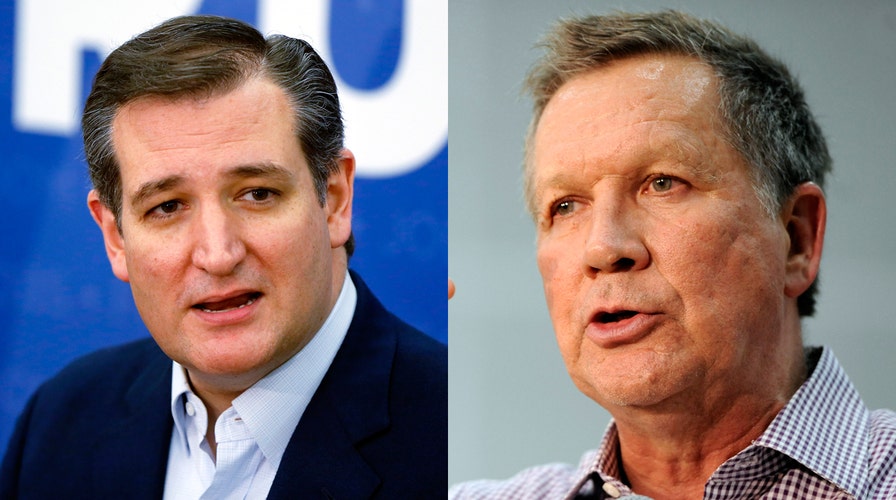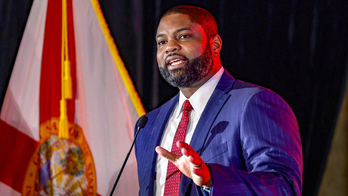Will Cruz and Kasich's plan to take down Trump work?
Strategy Room: Jeanne Zaino and Robert O'Brien discuss Cruz and Kasich strategy in Indiana, Oregon and New Mexico
John Kasich and Ted Cruz made the extraordinary announcement late Sunday of their intentions to coordinate campaigns in order to deny frontrunner Donald Trump a sweep of important primaries in three states -- but it remains far from clear whether the ambitious strategy will pay off.
The two campaigns released simultaneous statements, announcing that Kasich would pull out of Indiana to give Cruz a clear run in Indiana’s primary on May 3, while the Cruz campaign said it would “clear the path” for Kasich in Oregon, which votes May 17, and New Mexico, which votes June 7.
Kasich adviser Charlie Black told FoxNews.com that it’s not a new strategy, and makes sense considering the limited resources available.
“It’s not a new strategy, as you go through these campaigns, people coordinate their efforts. It’s not the first time it’s been done,” Black said. “Since we have limited resources, and we both have the goal to stop Trump getting to 1,237 it makes sense to pick the states where one is better than the other.”
The strategy was encouraged in March by 2012 Republican nominee Mitt Romney as part of an effort to force a contested convention in July and to stop Trump from getting the nomination.
The first test of the strategy will be in Indiana on May 3. The latest Fox News poll shows Trump with a comfortable eight-point lead over Cruz in Indiana. Trump holds 41 percent of voters, while Cruz has 33 percent, with Kasich trailing with 16 percent.
On paper, that math appears to work for Cruz and Kasich’s strategy. If just more than half of Kasich’s voters moves to Cruz, and very few move to Trump, then the Texas senator will win the state, and a greater share of the 57 delegates available.
Oregon has 28 delegates up for grabs, while New Mexico has 24. Therefore, if the strategy works in the three states, it would make Trump's prospect of hitting 1,237 extremely narrow.
However, David A. Caputo, Professor of Political Science in New York’s Pace University, told FoxNews.com that the assumption that some of that vote won’t leak to Trump is flawed.
“The assumption is that Indiana voters are largely conservative, therefore when Kasich is out, voters will go to Cruz. I would argue, however, that some of that vote goes to Trump and so that strategy going forward may not work,” Caputo said.
As a wider strategy, Caputo says the transferability of votes that the two campaigns are assuming exists may not be there after all, and that it could even have unintended consequences.
“I think it could have a boomerang effect. If I’m a Kasich supporter and told to vote for Cruz, I may just think ‘wait a minute I’m for the candidate but I don’t like being told what to do’ and they might go and vote for Trump instead,” Caputo said.
Black said the alternative would be better for Trump.
“If each campaign has limited resources and you spread them thinly across all the states, then Trump gets an advantage from that,” he said.
GOP strategist Ron Bonjean said the move was a broader sign that the campaigns were struggling in their fight to stop Trump, and called it a “desperate move.”
"This feels like a desperate move to keep the Cruz and Kasich campaigns alive with the hopes that either one of them might prevail in a contested convention,” Bonjean told FoxNews.com. “It’s an admission by Cruz that his campaign cannot create the momentum or sustain itself without the Kasich campaign because there is simply too much ground to cover and not enough resources.”
Lisa Boothe, president of High Noon Strategies -- a political communications firm -- said the move was “unprecedented."
"It underscores how divided the Republican Party is that two presidential candidates would join together in such an unprecedented open fashion to stop Donald Trump from getting the nomination,” Boothe told FoxNews.com.
She added that the move may even help Trump's narrative: “Donald Trump's message that the system is rigged has worked to his advantage and this only adds fuel to the fire."
Kasich sought to tone down the implications of the strategy Monday, telling reporters in Philadelphia it was “no big deal” and a recognition of the realities of the campaign.
“I didn’t spend resources in the state of Wisconsin. I don’t have Daddy Warbucks standing behind me, giving me all this money,“ Kasich said as he tucked into a plate of eggs at a diner. “I’m not campaigning in Indiana and [Cruz] is not campaigning in New Mexico, that’s all it is. No big deal.”

























